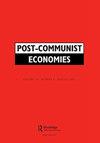Remittances, FDI and economic growth: the case of South-East European countries
IF 2.2
3区 经济学
Q2 ECONOMICS
引用次数: 1
Abstract
ABSTRACT South-East European countries rely heavily on remittances and FDI as external sources of financing. Hence, an investigation of the behaviour of remittances and FDI during the business cycle and their impact on economic growth is of crucial importance. To achieve this objective, we first analyse the cyclical nature of remittances and FDI flows in Albania, Bosnia and Herzegovina, Croatia, Montenegro, the Republic of North Macedonia, and Serbia (SEE6) during their business cycles in the 2008q1-2021q2 period. Second, we investigate the causal link among these variables, and find out that although at the aggregate level remittances and FDI move synchronously and in the same direction as the business cycle, there are considerable variations across countries. Following Dumitrescu-Hurlin Panel Granger causality test, we find that for most SEE6 there is a bidirectional causal relationship between remittances and economic growth, i.e. economic growth is caused by remittances, and GDP growth also stimulates remittances.汇款、外国直接投资和经济增长:以东南欧国家为例
东南欧国家严重依赖汇款和外国直接投资作为外部融资来源。因此,对商业周期中汇款和外国直接投资的行为及其对经济增长的影响进行调查至关重要。为了实现这一目标,我们首先分析了阿尔巴尼亚、波斯尼亚和黑塞哥维那、克罗地亚、黑山、北马其顿共和国和塞尔维亚(SEE6)在2008年第一季度至2021第二季度商业周期中的汇款和外国直接投资流动的周期性。其次,我们研究了这些变量之间的因果关系,并发现尽管在总体水平上汇款和外国直接投资与商业周期同步且朝着同一方向移动,但各国之间存在相当大的差异。通过dumitrescup - hurlin面板格兰杰因果检验,我们发现在大多数SEE6中,汇款与经济增长之间存在双向因果关系,即经济增长由汇款引起,GDP增长也刺激汇款。
本文章由计算机程序翻译,如有差异,请以英文原文为准。
求助全文
约1分钟内获得全文
求助全文
来源期刊

Post-Communist Economies
ECONOMICS-
CiteScore
4.90
自引率
18.20%
发文量
21
期刊介绍:
Post-Communist Economies publishes key research and policy articles in the analysis of post-communist economies. The basic transformation in the past two decades through stabilisation, liberalisation and privatisation has been completed in virtually all of the former communist countries, but despite the dramatic changes that have taken place, the post-communist economies still form a clearly identifiable group, distinguished by the impact of the years of communist rule. Post-communist economies still present distinctive problems that make them a particular focus of research.
 求助内容:
求助内容: 应助结果提醒方式:
应助结果提醒方式:


